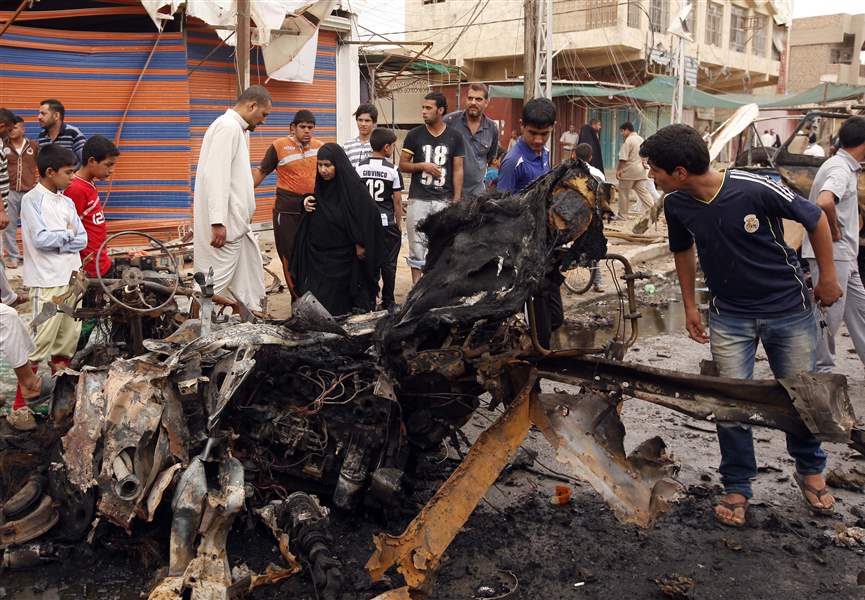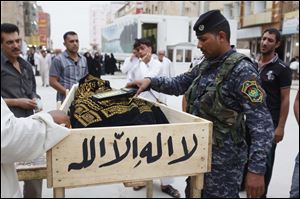
After deadly day, new attacks in Iraq kill 7 people and wound dozens
5/21/2013
Civilians inspect the scene of a car bomb attack in the Kamaliyah neighborhood, a predominantly Shiite area of eastern Baghdad, Iraq, Monday.
ASSOCIATED PRESS

An Iraqi policeman runs his metal detector over the body of Mohammed Adnan, 22, at a checkpoint as the body arrives for burial in the holy Shiite city of Najaf, 160 kilometers (100 miles) south of Baghdad, Iraq, Monday, May 20, 2013. A wave of car bombings across Baghdad's Shiite neighborhoods and in the southern city of Basra killed and wounded dozens of people, police said. (AP Photo/ Alaa al-Marjani)
BAGHDAD — New attacks in Iraq killed seven people and wounded dozens today, officials said, after a bloody day that claimed more than 100 lives across the country.
A suicide bomber set off his explosives-laden vest at a military checkpoint in the town of Tarmiyah, 30 miles north of Baghdad. The blast was followed by militants who opened fire at the Iraqi troops, killing three soldiers and wounding nine, a police official said.
A medical official confirmed the causality figures. Both officials spoke on condition of anonymity because they were not authorized to talk to the media.
Meanwhile, in the northern city of Tuz Khormato, two parked car bombs went off simultaneously, killing three civilians and wounding 38 people, said Mayor Shalal Abdool. The town is about 130 miles north of the Iraqi capital.
And in Kirkuk, 180 miles north of Baghdad, three bombs exploded back-to-back at a sheep market, killing one person and wounding 25, police Col. Taha Salaheddin said.
The attacks came as authorities raised the death toll from Monday’s wave of bloodshed — a series of blitz attacks stretching from north of Baghdad to the southern city of Basra and targeting bus stops, open-air markets and rush-hour crows — to 113 from 95, after many of the wounded died of their injuries.
No one has so far claimed responsibility for the attacks, but such systematic carnage carries the hallmarks of the two sides that brought nearly nonstop chaos to Iraq for years: Sunni insurgents, including al-Qaida’s branch in Iraq, and Shiite militias defending their newfound power after Saddam Hussein’s fall.
The latest spiral of violence, which targeted both Sunni and Shiite communities, has increased fears that Iraq is sliding back to the brink of civil war.
Hours after Monday’s stunning bombings, Prime Minister Nouri al-Maliki accused militant groups of trying to exploit Iraq’s political instability and vowed to resist attempts to “bring back the atmosphere of the sectarian war.”
Sectarian tensions have been worsening since Iraq’s minority Sunnis began expanding protests over what they say is mistreatment at the hands of the Shiite-led government.
Many Sunnis contend that much of the country’s current turmoil is rooted in the policies of al-Maliki’s government, which they accuse of feeding sectarian tension by becoming more aggressive toward Sunnis after the U.S. military withdrawal in December 2011.
Mass demonstrations by Sunnis, which began in December, have largely been peaceful. However, the number of attacks rose sharply after a deadly security crackdown on a Sunni protest camp in northern Iraq on April 23.